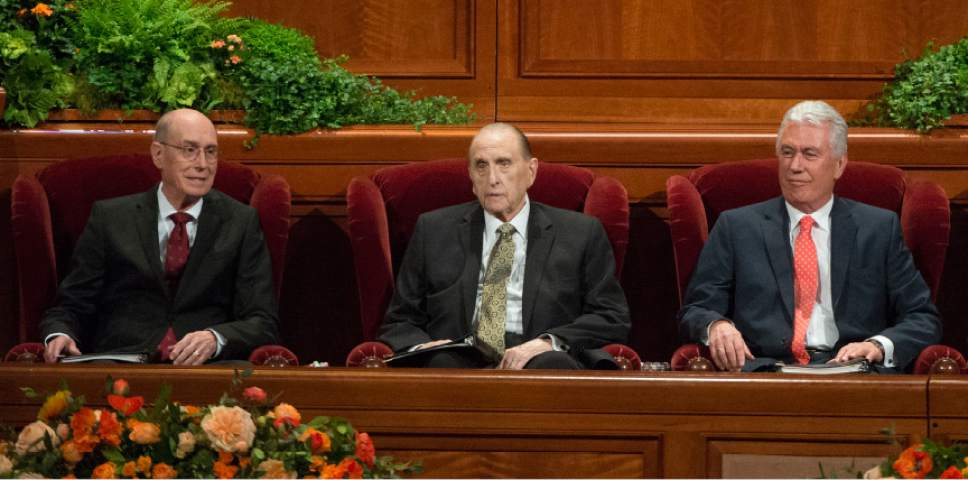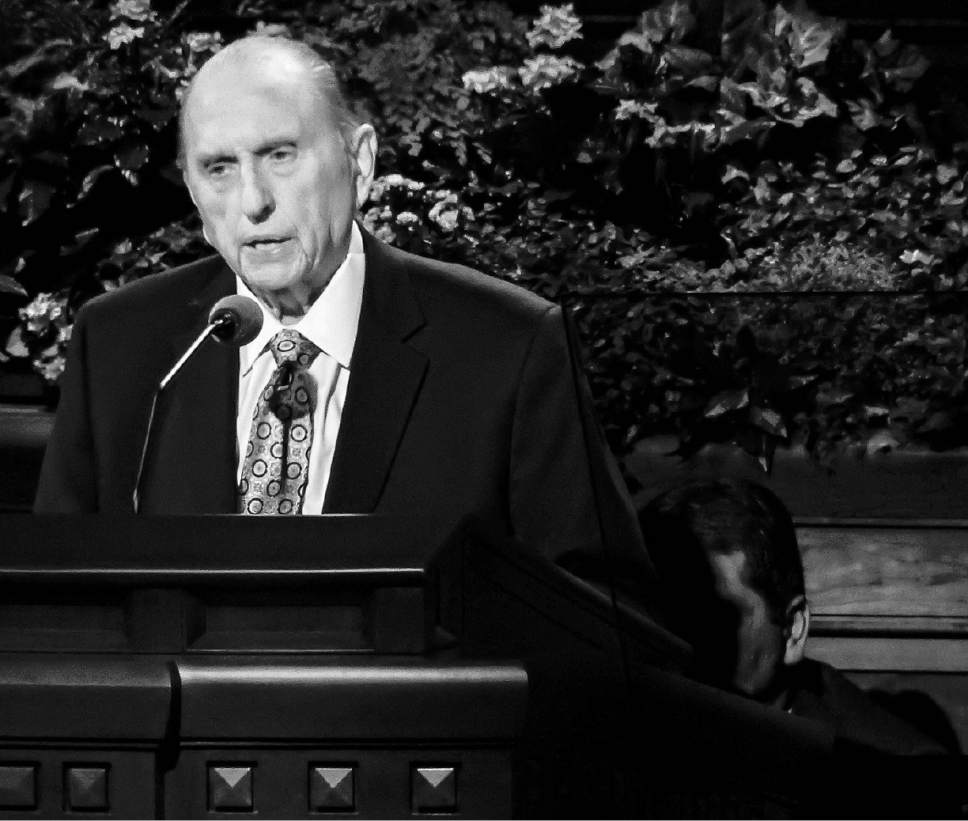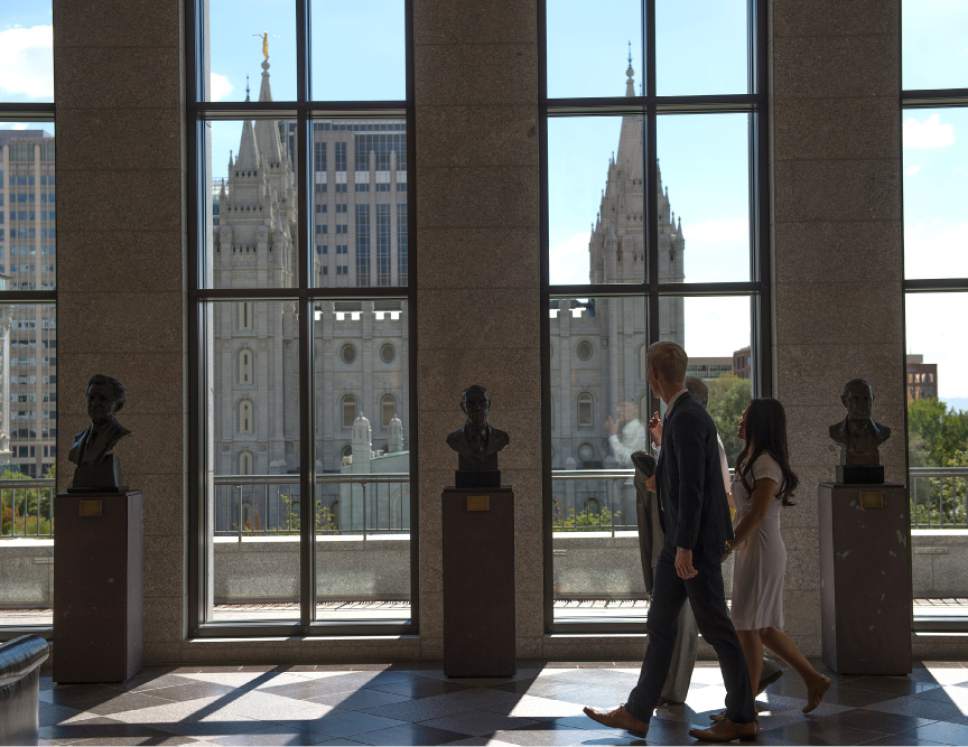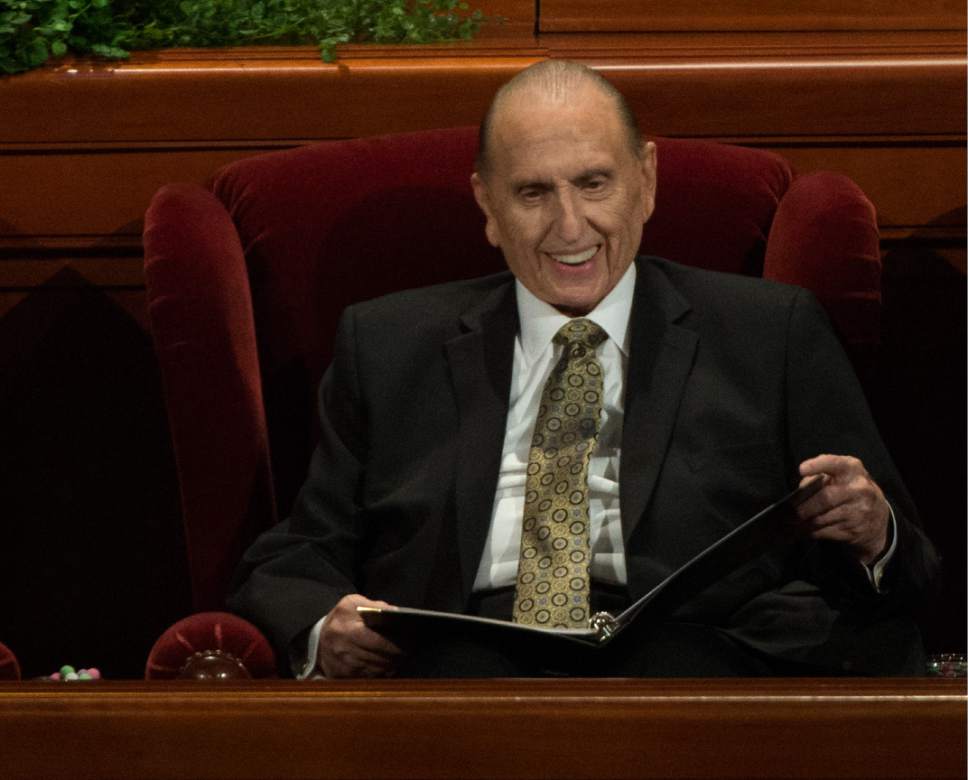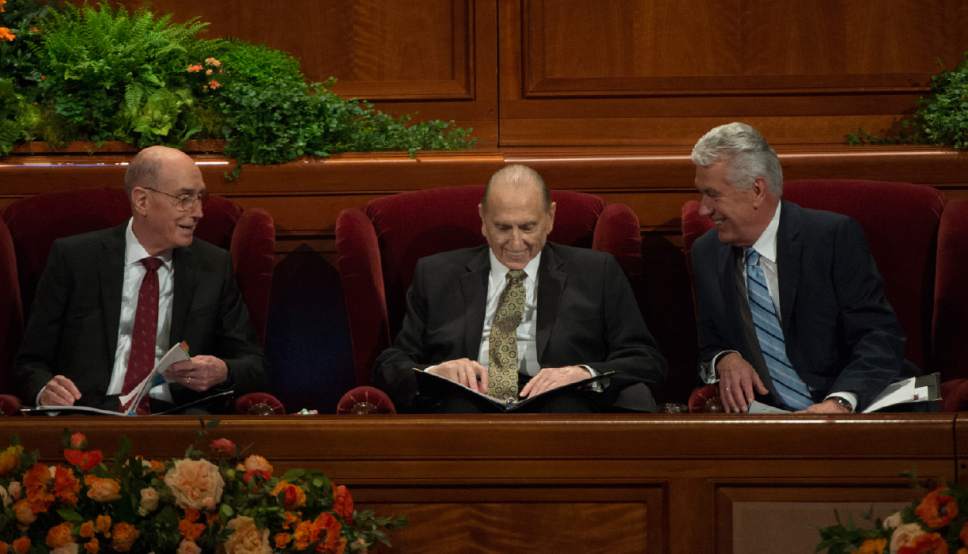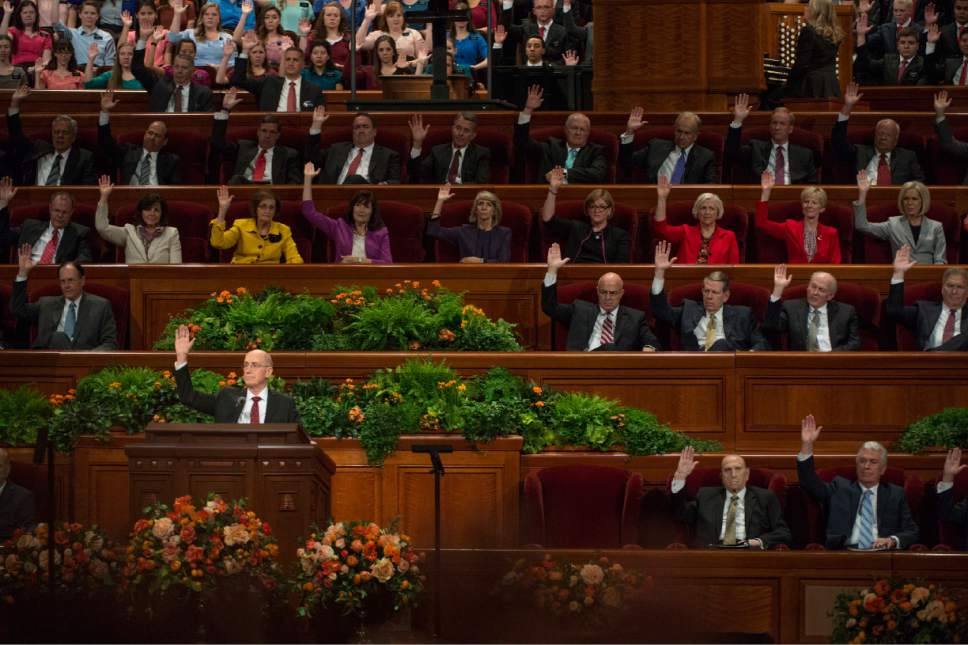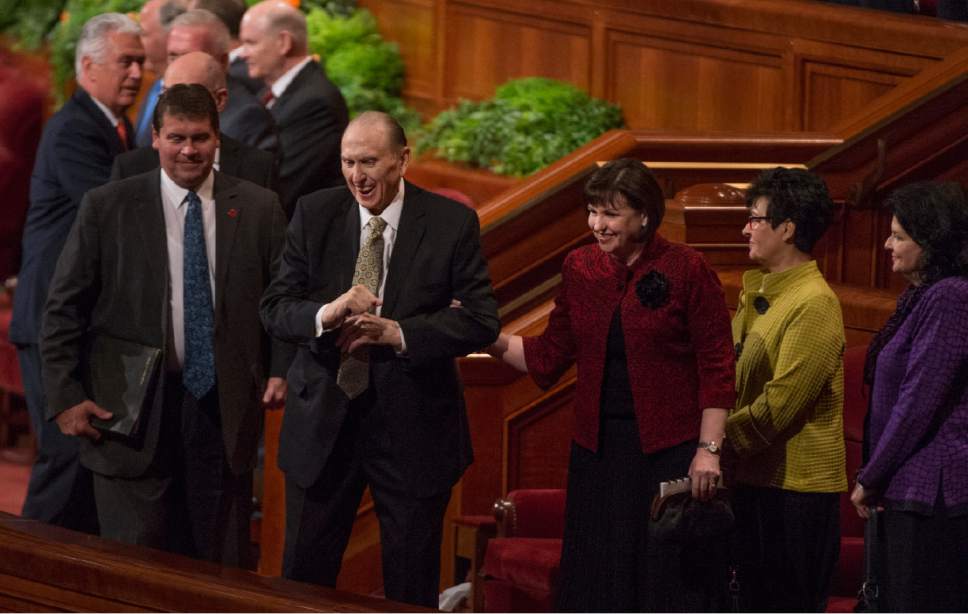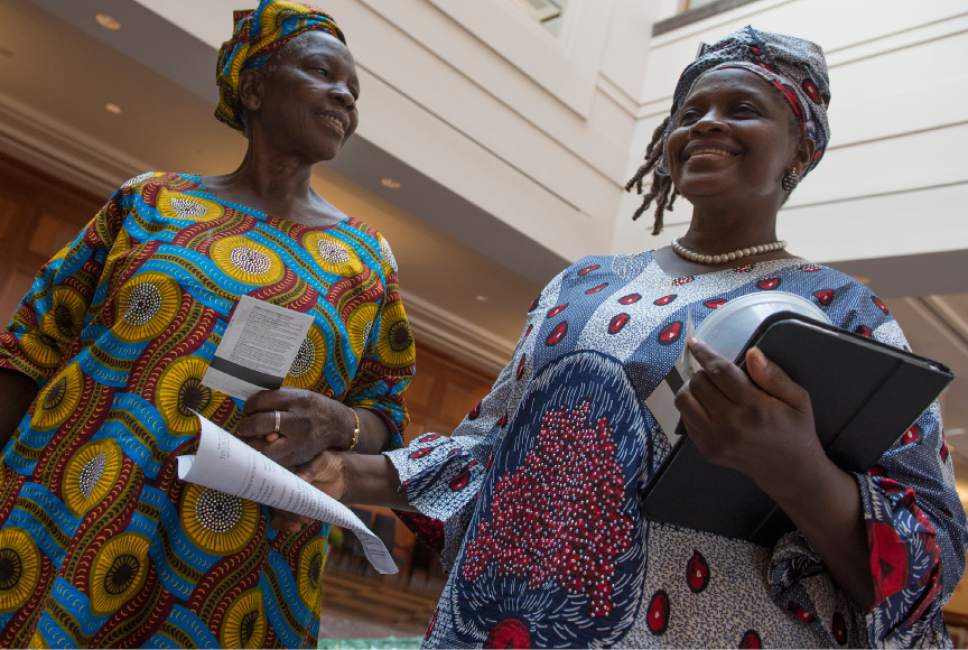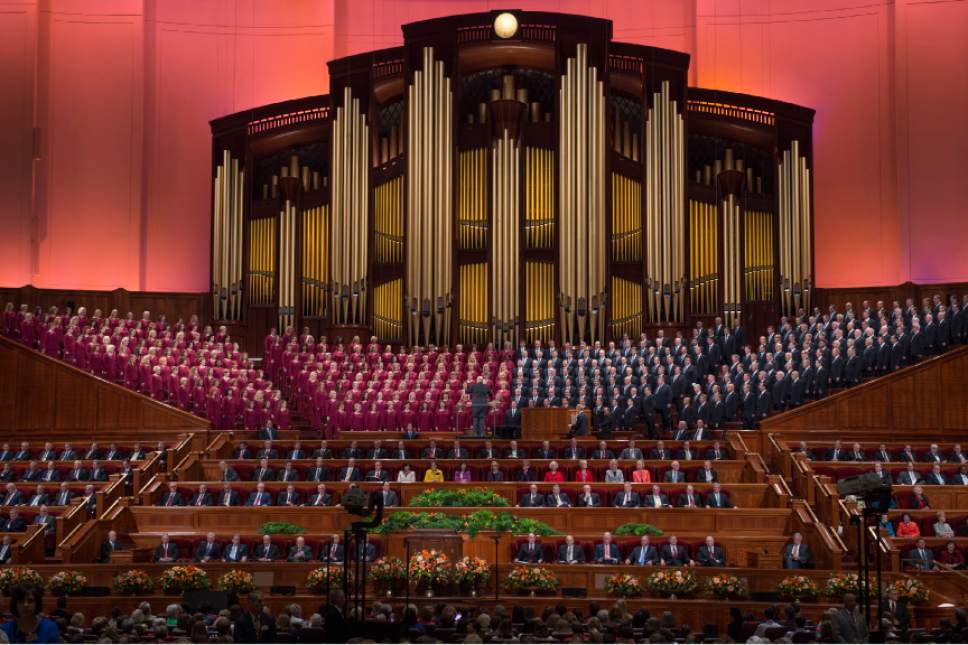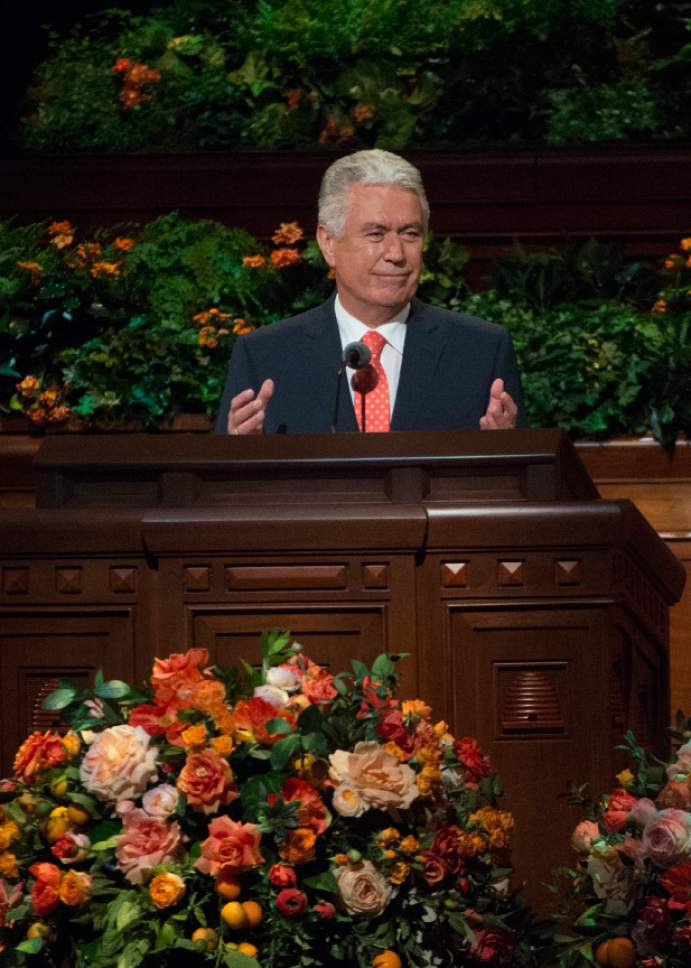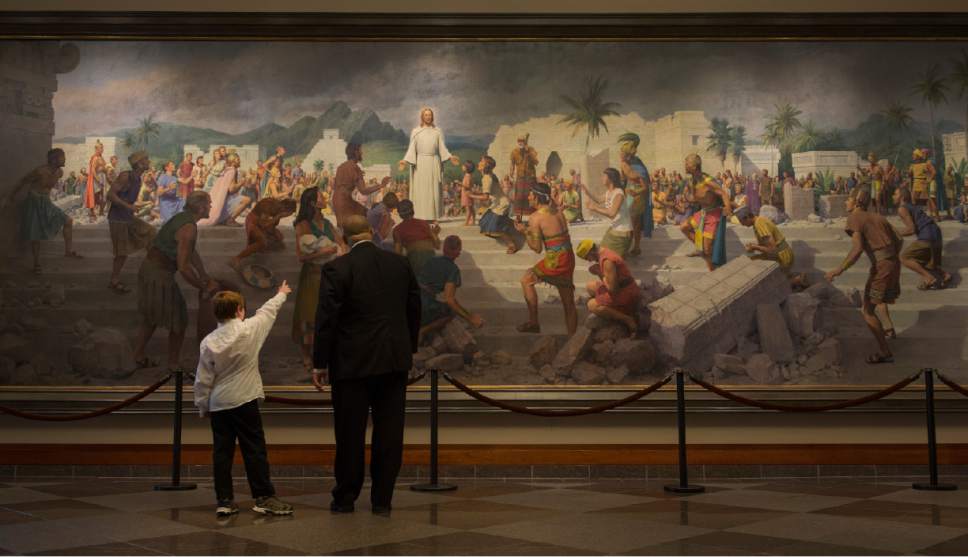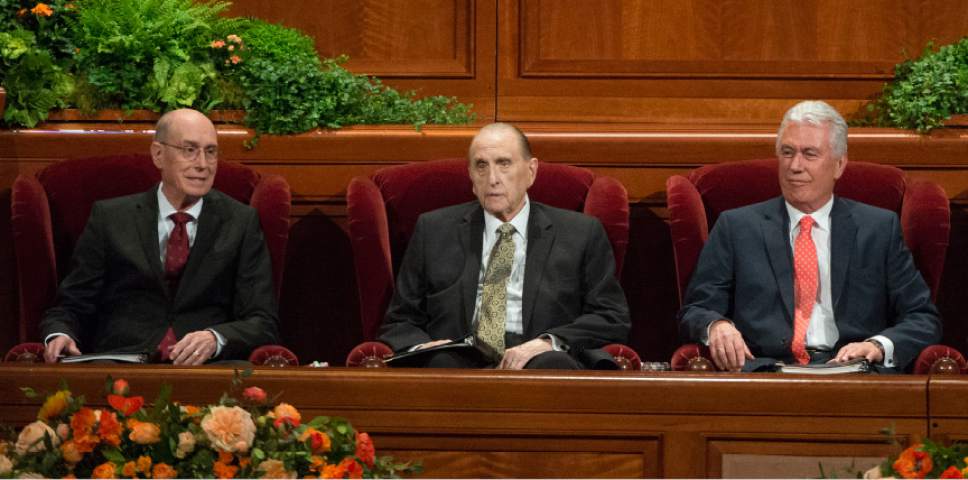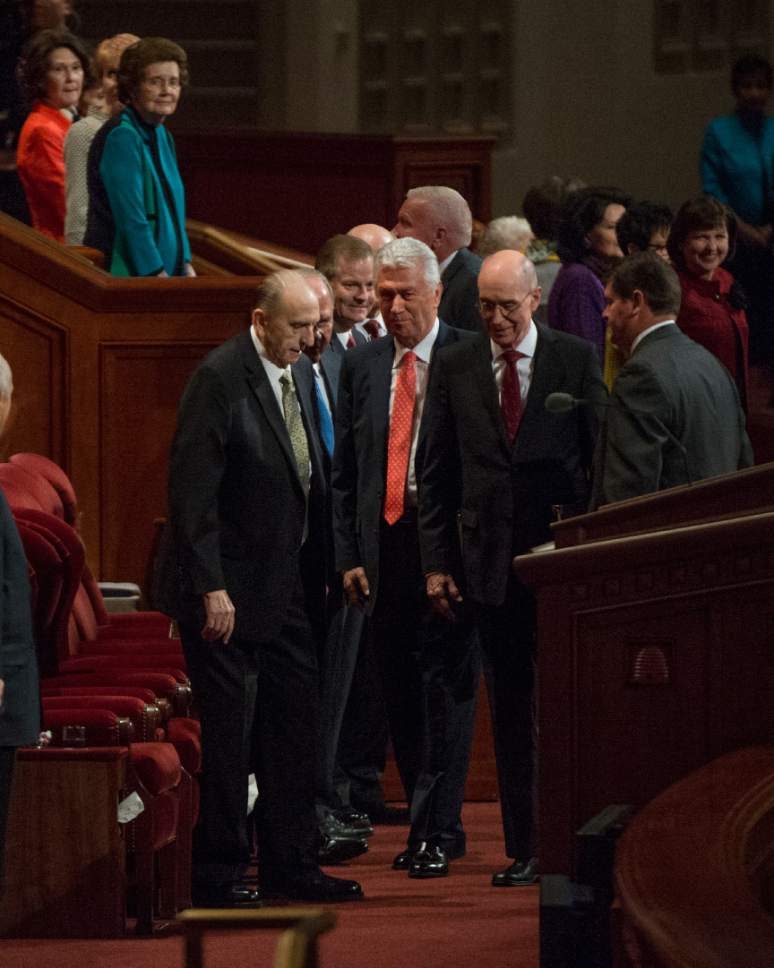This is an archived article that was published on sltrib.com in 2016, and information in the article may be outdated. It is provided only for personal research purposes and may not be reprinted.
Top LDS leaders warned Mormons on Saturday not to mistake God's "perfect love" for heavenly acceptance of sin, not to fall prey to Satan's stumbling blocks, and not to take for granted the faith's "life-changing truths."
Scriptures describe the Almighty's love as wonderful, redeeming and everlasting, but not "unconditional," apostle D. Todd Christofferson told the thousands gathered in downtown Salt Lake City — and millions more watching around the globe — for this fall's General Conference of The Church of Jesus Christ of Latter-day Saints.
"The word 'unconditional,' " the Mormon leader said, can "convey mistaken impressions about divine love, such as, God tolerates everything and does not judge us because his love is unconditional, or God makes no demands upon us because his love is unconditional, or all are saved in the heavenly kingdom of God because his love is unconditional."
Divine love is "infinite" and will "endure forever," Christofferson said, but how it affects individuals "depends on how we respond."
"To abide in God's love ... means to submit fully to his will," he said, "It means to accept his correction when needed. ... It means to love and serve one another as Jesus has loved and served us."
And it requires repentance, Christofferson said, because God will not "save his people in their sins but from their sins."
President Thomas S. Monson, Mormonism's 89-year-old leader, attended Saturday's sessions, assisted to and from his seat in the Conference Center by an aide.
Monson and his two counselors, who make up the faith's governing First Presidency, took their places behind the pulpit, but on the opposite side of where they usually sit.
President Dieter F. Uchtdorf, Monson's second counselor, opened Saturday's sessions by warning his listeners in the 15.6 million-member church not to take LDS principles for granted.
"In this church, we have been given so much. We are surrounded by such an astonishing wealth of light and truth that I wonder if we truly appreciate what we have," he said. "Life-changing truths are before our eyes and at our fingertips, but sometimes we sleepwalk on the path of discipleship. Too often we let ourselves be distracted by the imperfections of our fellow members instead of following the example of our Master. We tread a path covered with diamonds, but we can scarcely distinguish them from ordinary pebbles."
What does the Almighty want in return, Uchtdorf asked, for the "flood of light and truth God has poured out upon us?"
Only that believers "live by the truth we have received," he said, "and that we follow the path he has provided."
Uchtdorf drew laughs when he mentioned the struggles he faced years ago trying to use a computer.
"It took a great deal of time, repetition, patience, no small amount of hope and faith, lots of reassurance from my wife, and many liters of a diet soda that shall remain nameless.
"Now ... I am surrounded by computer technology," said the 75-year-old Uchtdorf. "I have an email address, a Twitter account and a Facebook page. I own a smartphone, tablet, laptop and a digital camera. And, while my tech skills may not quite measure up to those of a typical 7-year-old, for a
septuagenarian, I do all right."
Fellow apostle Quentin L. Cook outlined several "stumbling blocks" that undermine Mormon faith.
The first is elevating Greek traditions and pagan ideas over "the simplicity of the savior's message."
"The preferred strategy of the adversary is to lead people away from God," Cook said, "by emphasizing the philosophies of men over the savior and his teachings."
Some reject the gospel, he said, "because in their view it doesn't have adequate intellectual sophistication."
In addition, many people "engage in sinful conduct, but refuse to consider it sinful," Cook said. "They have no remorse or willingness to acknowledge their conduct as being morally wrong."
Another modern vice, he said, is extremism, which has infected some Latter-day Saints as well.
"Gospel extremism is when one elevates any gospel principle above other equally important principles," he said, "and takes a position that is beyond or contrary to the teachings of church leaders."
As an example, the apostle mentioned those who advocate "additions, changes, or primary emphasis to one part of the Word of Wisdom" — the Mormon health code that forbids alcohol, tobacco, tea and coffee.
Cook did not go into detail, but his suggestion prompted wide-ranging speculation on social media. Was the apostle talking about opioids? Meat? Dairy products, gluten, or — gulp — sugar? No telling.
The apostle further condemned "expensive preparation for 'end-of-days scenarios.' "
Apostle Robert D. Hales, weakened in recent years by ill health, paid tribute to caregivers for their "quiet, unheralded service," specifically Mary, his wife of 63 years.
"She has given all in compassionate nurturing and love," the 84-year-old LDS leader said. "Her hands reflect [Jesus' gentle, sustaining touch. I would not be here without her."
Hales also noted that parents and grandparents tend to "bemoan the state of the world — that schools are not teaching moral character."
"But there is much we can do," he said. "We can take advantage of the teaching moments in our own families — now."
What about adult children who stray from the faith?
"We cannot pray away another's agency," Hales said. "We can pray for guidance about when to speak and what to say, and when to be still. ... Ultimately the choice to love and follow the Lord has to be their own."
Craig C. Christensen of the Presidency of the Seventy said Mormons "need not be timid about testifying" of the mission of church founder Joseph Smith — from his report of a heavenly vision at age 14 to his "translation" of the faith's signature scripture, the Book of Mormon.
"To any who may be questioning their testimony of Joseph Smith or are struggling with erroneous, misleading or superficial information about his life and ministry," Christensen said, "I invite you to consider the fruits — the many blessings that have come to us through [Smith's] miraculous mission."
Carol F. McConkie, first counselor in the general presidency of the faith's Young Women organization for teenage girls, said that God will never leave humans alone to fight battles, face adversity or find answers.
Believers can seek this help through prayer, she said, which is "essential to developing faith."
"Miraculous healing, powerful protection, divine knowledge, liberating forgiveness and precious peace," she said, "are some of the answers to a soul's sincere desire."
Both J. Devn Cornish of the Seventy and Neil L. Andersen of the Quorum of the Twelve Apostles cautioned the faithful not to be too hard on themselves.
"We must stop comparing ourselves to others. We torture ourselves needlessly by competing and comparing. We falsely judge our self-worth by the things we do or don't have and by the opinions of others," Cornish said. "If we must compare, let us compare how we were in the past to how we are today, and even to how we want to be in the future."
Those who "really try and will not rationalize or rebel, repenting often and pleading for the grace or help of Christ," he said, " ... are going to be 'good enough.' "
Andersen said guilt can be helpful, but it only goes so far.
"Guilt is like a battery in a gasoline-powered car. It will light up the car, start the engine, and power the headlights, but it will not provide the fuel for the long journey ahead," the apostle said. "The battery, by itself, is not sufficient. And neither is guilt."
The Utah-based faith believes it has a mission to spread its gospel across the world. But it cannot be done by full-time missionaries alone, Andersen said. It requires rank-and-file members as well.
"The spiritual work of helping someone come into the Kingdom of God is a group effort," he said. "Enlist the missionaries as soon as you can, and pray for heavenly help. But remember, the timing of another's conversion is not fully up to you."
As the afternoon session's final speaker, apostle Dallin H. Oaks discussed how and when members should share the church's teachings.
Live your life as a committed Latter-day Saint, listen to divine promptings, he said, and be ready to share your beliefs at any time.
"We need the guidance of the Lord because at any particular time some are, and some are not, ready for the additional truths of the restored gospel," Oaks said. "We should never set ourselves up as judges of who is ready and who is not. The Lord knows the hearts of all of his children."
He especially encouraged young Mormons to spread the word on social media, saying, "Go to it, youth."


